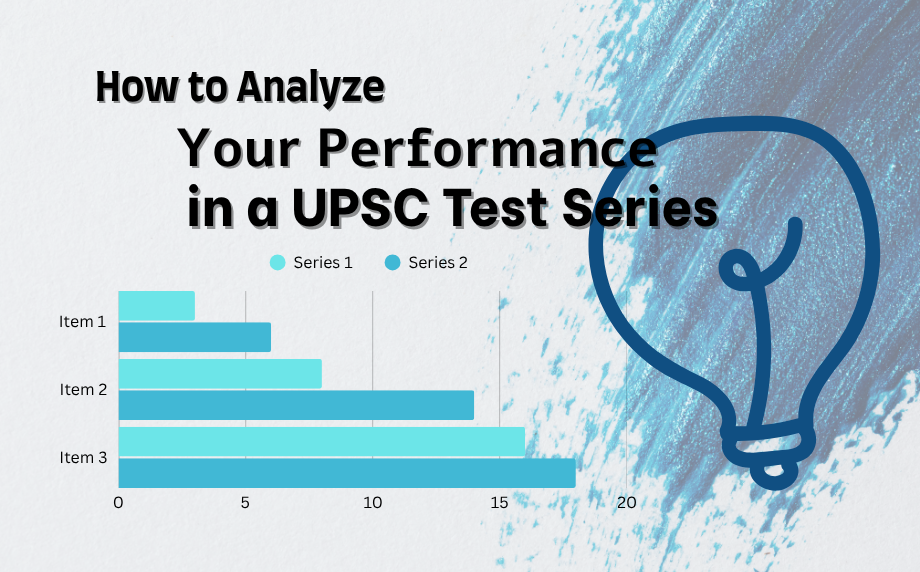As one of the toughest competitive exams in India, success in the UPSC examination is directly correlated with regularly practicing test series. Regular mock tests assess your progress and show your strengths and weaknesses. More importantly, a debrief on every test could be the golden key to unlocking performance. The purpose of this guide is to help you determine how to analyze your performance in a UPSC test series in a way that you drain the most out of it and are on a trajectory of clearing the exam.
The Importance of Analyzing Your Test Series Performance
- Benchmarking Progress:
Each test series is a checkpoint where you can judge your progress over a period of time. This will help you to measure your distance on your path, comparing the way you were and the improvement you have achieved today.
- Identifying weak points early on:
Mock tests show you the topics that need more time. Early identification of weak areas gives enough time to plug those topics in revision, avoiding huge gaps in knowledge later.
- Enhancing Test-Taking Approach:
Managing Time, Topic Selection, and Stress During Exams Reviewing your performance helps develop a test-day strategy so you feel comfortable during the actual test.
- Adapting to Exam Patterns:
You should be familiar with the format of the exam, the type, and the difficulty level of the question. When analyzing regularly, you adapt yourself, thus reaping the minimum on the day of the actual exam.
Review Your Scores
Prelims Analysis:
- Marks and sectional distribution (General Studies, etc.), CSAT, etc.
- Identify the sections that consistently score high or low.
Mains Analysis:
- Marks sharing across General Studies, Essays, and Optional papers
- Detect patterns: Is your score getting better with time, or are there some ups and downs?
Identify Strengths and weaknesses
Pinpoint Weak Areas:
- Make a list of topics in which you earned low marks. For example, if you are scoring consistently low in geography, then the revision needs to be focused on the subject.
- Reinforce weak areas using focused materials like standard textbooks, video lectures, and practice questions.
Recognize Strong Areas:
Recognize topics where you frequently become proficient. Although it is tempting to look only at weaknesses, it is also necessary to maintain strengths. Keep up the great performance by revising.
Evaluate Time Allocation:
Evaluate the time you are taking in each part of it. Do you devote more than enough time to the easy questions, and rush through the harder questions? Balance is key.
Mentor for Answer Writing (For Mains)
Precision and Clarity:
Check how your answers are structured: intro key ideas and conclusion. Be consistent and maintain form.
- Content Relevance:
Check if your answers respond to each part of the question. If it does not pertain to the topic of your article
- Improve Writing Speed:
Answering process time-bound practice. If you have issues with time management, practice under real testing conditions to develop your speed, and discard it.
- Use of Diagrams and Charts:
Use flowcharts, maps, and diagrams, where possible. These not only help in making the presentation but better convey information.
Focus on Speed and Accuracy (For Prelims)
- Accuracy Assessment:
Check how many questions you answered correctly and incorrectly. Try to get them right instead of answering more questions by guessing.
- Avoid Guesswork:
Go over questions that you attempted by guessing. Do your best to reduce the amount of wild guesses; negative marking can crush your score.
- Time Management:
Consider if you managed to finish the test in the available time. These could be sections you found hard to keep pace on, practice those.
Use Test Series Data to Refine Your Study Plan
- Topic-Wise Adjustments:
Depending on your analysis, create a strategy and spend more time on weaker subjects; So focus on areas where your knowledge is lacking
- Focus on Current Affairs:
If you are weak on current affairs, add a daily news digest to your schedule. This includes using subject-wise study materials, Month Current Affairs magazines, and tests based on recent affairs.
- Mock Interviews for Mains:
If your test series offers mock interviews, use the feedback to improve your performance. Speak, confidently, and concisely.
Key Metrics to Focus On
- Analysis of Attempt: Check performance in GS vs CSAT.
- Speed & Accuracy: See how many questions you can answer correctly in the allotted time.
- Elimination Strategy: The more you learn to eliminate the 3 wrong ones.
For Mains:
- Substance/Quality of the Content: Make sure that your answers provide relevant facts, examples, and analysis.
- Answer Expandability: Answers should move to the details (yet sufficient) if needed. Do not waste words elaborating.
- Overall Marks: Paper Wise Track marking of optional + all paper types for where you should focus
Creating an Actionable Strategy Post-Analysis
- Daily and Weekly Reviews:
Allocate Specific Time To Analyze Each Test Regular reviews help you stay in touch with your progress and keep the momentum going.
- Peer Discussions:
Talking to peers or mentors about performance can give you a new perspective. They can point out what you may miss and recommend efficient ways to make progress.
- Continuous Revision:
Regular revision is critical. Don’t wait until the final weeks to revisit areas of weakness. Analyze your performance and set up a guided revision plan with more focus on the high-yield topics.
- Final Phase Strategy:
In the final months before the exam, work on further cementing your strengths and developed weaknesses. Use test series reports to focus on topics you can score high.
Why Choose ExamPay for Your UPSC Test Series?
ExamPay, after all, knows how critical a role test series plays for qualifying UPSC. Our offerings include:
- All India Coverage: Questions from the whole of the syllabus, including Current Affairs.
- Simulated Real Exam: Mock tests that replicate the actual UPSC exam format and difficulty level.
- Individual Performance Reports: Comprehensive reports on strengths, weaknesses, and actionable enhancements.
- Flexible Scheduling: Taking tests anywhere, any time.
- Well-Priced: Test series of the quality available at reasonable rates.
- Interactive Doubt Sessions: Connect with mentors for one-on-one support.
Conclusion
It is not just a matter of glancing through the scores to understand your performance in the UPSC test series. By analyzing regularly, you correct your strategy, work hard in weak areas, and gain enough confidence to face the exam. And if performance analysis becomes a habit, you are all set to clear the UPSC with flying colors.
FAQ’S
- How often should I take a UPSC test series?
If you take one test per week, you have plenty of time to analyze and improve.
- What should I focus on more in Prelims—accuracy or speed?
Accuracy is crucial and speed comes with practice. Avoid Guessing to Increase Overall Score
- How do I improve myself in writing answers in the Mains test Series?
Do it every day, work on structuring the answers, and use the feedback of seniors.
- Can I analyze my UPSC test series performance without feedback from mentors?
Yes, you can—detailed report analytics and peer discussion can lead to self-analysis.






